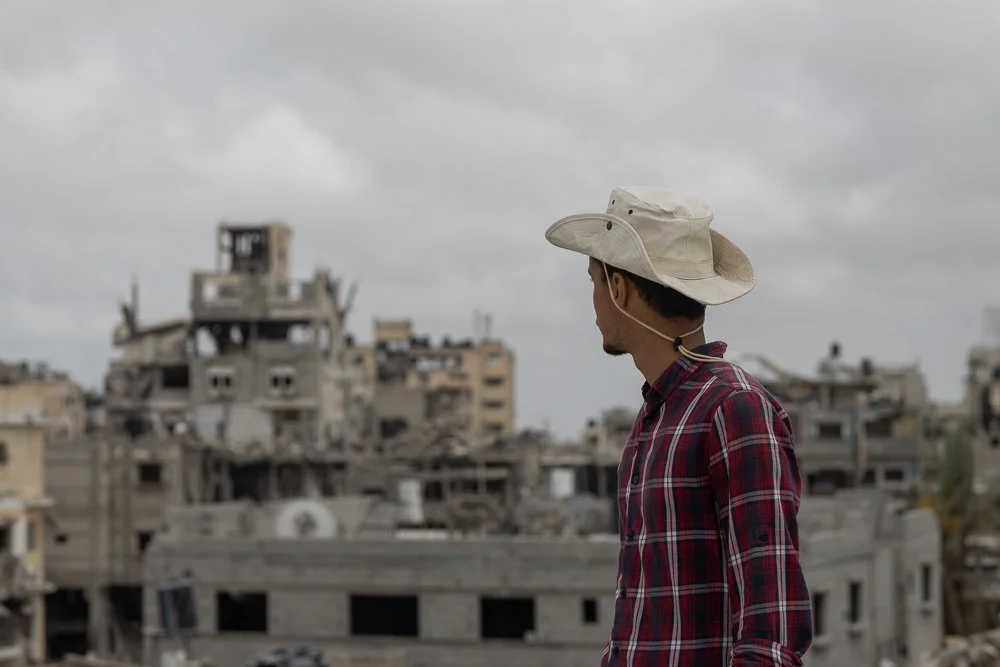IMAGES & WORDS BY MAHDY ZOUROB
Gaza. Here, the residents shine with an unwavering vitality, endeavoring with all their might to recreate the enchantment of our land and spirit as a people.
Before the genocide, I was a narrator of beauty.
Today, I find myself documenting the wounds where creativity emerges from the ashes of adversity. Confronting merciless destruction, green spaces rise as symbols of resilience and renewal. These spaces become canvases that defy destruction and transform into a visual event carrying a powerful message to the world. - Mahdy Zourob
Mohammed Shakshak
“I’m 21 years old and I’m originally from eastern Khan Younis, but displacement brought me to Mawasi Khan Younis. I live in a camp, like many people in Gaza, whose lives are filled with never-ending hardships. But despite everything I go through, there’s one thing I won’t let go of — my passion for farming. It’s the only relief from the inescapable pressures of daily life.
It feels like they’re more than just plants. Even with the difficulty of getting water, I never hesitate to put in all the effort to keep them alive. Sometimes I spend hours bringing frozen water from far-off places, but every time I water the land, I feel I’m reviving parts of myself, bringing a small piece of life back into the surrounding destruction.
I learned my love for farming from my father. He always encouraged me to take care of the land, telling me it’s the source of life and reflection. I loved when he would talk to me about the beauty of nature and the cycle of life in it. Before we were forced to flee, I had a small farm in our garden that was full of plants and trees. It was a place to play, care for things, and provide fresh food. I was proud of everything that grew under my hands. But my farm was destroyed.
So next to my camp, I decided to start again. I brought life back to the ruins, gathering seeds from neighbours and adding a touch of life to the destruction around us.
But as always, we can never live in peace. The Israeli forces occupied the area near my tent and my crops were once again destroyed. Even so, I can’t let go of hope. I am determined to rebuild my farm, even if they destroy everything once, twice or more.”
Bashar Zourob
“To me, the roof of the house was always more than just a space above my home. I had to turn it into my own little farm, filled with vegetables and herbs. Between the tomatoes, basil and sunflowers I found peace. Farming isn’t just a source of food for me; it was a symbol of my life, my passion and my love for the land.
But in a moment, everything changed. My home in Khan Younis where I had built my dreams, my farm that I tended to every day — gone, in a single strike.
Days passed and I returned to my house after the bombing had stopped. As I walked through the rubble, my heart was filled with both hope and fear. I entered the space that had once been my sanctuary, expecting to find nothing but ruins.
Suddenly, amongst the wreckage, I saw something unexpected — a basil plant, standing tall between the stones, as if it was saying “We are still here.”
It was saying hope is still alive; that we could start again.
So under the sun, amidst the rubble and noise of the city, I kept farming.”
Wael Al-Astal
“I find myself standing in what used to be my home in Khan Younis. As I walk through the rubble, memories flood my mind and I can’t help but think of what was once my lifeline — my small greenhouse, now reduced to wreckage.
Each plant I grew symbolized my relentless effort to give my loved ones a better life. Every seed that sprouted under my care was a testament to my perseverance.
But then the bombs came. The greenhouse that once brimmed with life was shattered, the crops I’d nurtured with my own hands obliterated. My heart broke with every step, the dreams I had sown lying in ruins.
Silence engulfed me as I found myself drifting back to when I worked tirelessly to provide food. I remembered the pride I felt, watching the fruits of my labour flourish. While all I could feel was devastation, I could feel the earth beneath my feet.
Battered, though it was, it felt alive.
Despite the loss, I had to rebuild. Together with the community we started planning how to gather new seeds, new tools and restart the garden — this time stronger and more resilient than before.
I can still picture it — the day my land will bloom again. Not just for me, but for my family and for the generations to come."
Mahdy is a recipient of our Revolutionary Storyteller Grant.























